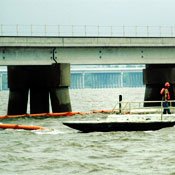Marine scientists are concerned about the future of the Gulf's coral reefs because of the unknown effects of dispersants, mixed with oil gushing from the ragged remnants of British Petroleum's decimated deepwater offshore oil rig.
"The oil companies are making a judgment call on a trade-off on which ecosystems to sacrifice: the shoreline and surface animals or the water column," Sandra Brooke, coral conservation director for the Marine Conservation Biology Institute of Bellevue, Wa., said. "It's partly a PR exercise, because no one wants to see this nasty stuff globbing up onshore, but with the amount of oil, you're not really trading anything off. Both ecosystems will get hit."
BP's Deepwater Horizon exploded April 20, killing 11 people and triggering an underwater geyser of oil 5,000 feet down, which continues to jet more than 210,000 gallons of oil a day. BP's efforts to disperse the spill have netted a significant decrease in the amount of surface oil riding the waves to Gulf state beaches; However, Brooke told the Jackson Free Press that BP's use of almost 600,000 gallons of a dispersant both on the surface and injected directly into the well, virtually insures that the oil will break its habit of floating and travel directly through the sea-water all along the Gulf. Bacteria feeding on the oil could consume all the oxygen in the water and create widespread incidence of dead zones comparable to the seasonal zooplankton dead zone near the mouth of the Mississippi River.
The dead zone could envelope delicate coral reefs as far as Florida Key's National Marine Sanctuary and Texas, but Brooke said an even more extensive deepwater reef spanning the Gulf could ultimately feel the impact.
"The problem with inserting dispersants at depth is that the most well-developed deepwater coral system we know of in the Gulf of Mexico is less than 100 kilometers up the shelf from (the massive leak). Nobody has been considering the effects of that dispersed crap on the real deep-water corals," Brooke said. "I've worked extensively on the deepwater system. We're going back there in September and I'm a bit concerned with what we're going to see."
The dispersant itself is toxic, but increases in toxicity when mixed with oil, according to the Environmental Protection Agency. Brooke said she feared the dispersant/oil mix could go far thanks to ocean currents in the Gulf, and doubted the legal claims against the company would ultimately counter the environmental damage.
BP made vocal commitments to attorneys general from five Gulf states at a May 6 meeting, including a commitment to quick claim assistance to fishing and tourist industry workers affected by the oil; a second commitment to waive a $75 million cap on liability and claims from the Transocean/Deepwater Horizon deepwater oil rig; and an agreement to dismiss contracts signed by boaters and fishermen BP paid to participate in the company's clean-up effort that prevented them from filing lawsuits over the spill.
BP Spokesman David Nicholas told the Jackson Free Press that the company is still committed to all vocal agreements with the AGs, including its willingness to pay beyond than the $75 million cap.
"BP CEO Tony Hayward has replied to (U.S. Secretary of Homeland Security Janet Napolitano) yesterday saying that we believe that the (legal) claims to us coming under this act will clearly exceed the $75 million limit, and we are prepared to pay above the $75 million on these claims and we won't seek reimbursement from the U.S. Oil Spill liability trust fund," Nichols said.
Calls to attorneys general from the five Gulf states were not immediately returned to confirm if BP's agreements have been put in writing.



Comments
Use the comment form below to begin a discussion about this content.
comments powered by Disqus